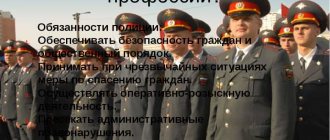What is the salary of FSIN employees in Moscow and other Russian cities in 2018-2019. How much do inspectors, doctors and other workers in prisons and camps earn? Today, society is increasingly concerned about the high level of crime, as well as the ability of the authorities to neutralize this crime. Therefore, the development of one of the structures in charge of security and order issues - the Federal Penitentiary Service (FSIN) - is relevant.
Structure of the FSIN and job responsibilities of its employees
In order to get a job at the Federal Penitentiary Service, you first need to understand the structure of this service. It has a central office in Moscow (where they receive the highest salaries), as well as territorial republican and regional departments. Each department has:
- Its own administrative apparatus is the management itself, the press service, as well as the internal security service, accounting, personnel department, psychological service,
- CITO is a division that deals with engineering and technical support,
- The convoy department, the operational unit - are engaged in combat and operational work,
- The institutions themselves where prisoners serve their sentences, including separate colonies where former service employees are kept,
- Special purpose departments have quite impressive powers, but they also have corresponding responsibilities, since such departments are responsible for the safety of not only prisoners and employees, but also visitors. The special forces of the Federal Penitentiary Service are engaged in eliminating emergencies, suppressing riots, searching for escaped prisoners,
- Institutions that belong to other areas, but are subordinate to the FSIN, are motor transport organizations, sanatoriums, construction departments, etc.
This complex structure is largely explained by the fact that, according to 2022 statistics, the FSIN has jurisdiction over more than 1 million citizens, and approximately half of them are so-called criminals. It is clear that in such a structure, not all employees have military ranks, and not many employees have direct contact with those who are serving time. That is, the HR department deals with personnel selection, and the accounting department deals with accounting. But psychologists can also work with convicts or suspects who are kept in pre-trial detention centers - for example, to determine their willingness to cooperate with the investigation.
Those who work in the security department usually have military ranks. By the way, dog handlers belong to this same department. There is a regime department staffed by employees who are directly responsible for maintaining order in penitentiary institutions. They also have military ranks. The latter are called inspectors. They monitor prisoners and control their behavior in places of detention, monitor the observance of the rights of prisoners, participate in their transportation and search, along with employees of other units. Inspectors also work in a separate service dedicated to the adaptation of released persons to life in freedom.
Corporation "Zone"
Today the FSIN is a huge “state corporation” with a net profit of over 1 billion rubles a year. The department controls 35 federal state unitary enterprises, which produce more than 100,000 types of products: clothing and footwear, furniture, special vehicles, trailers, building materials, pipes, fittings, and products.
Each federal state unitary enterprise has its own profile. If in the Krasnoyarsk Territory the local federal state unitary enterprise cuts and sells timber, then in St. Petersburg it produces canned fish. All by the hands of the condemned. There are 680,000 people in Russian colonies, prisons and isolation wards. Of these, 450,000 can work, but only 35% of prisoners - 158,000 people - are employed in paid work.
“Never, even during the period of maximum development of production, have we created new types of production on our own,” Alexander Sorokin, head of the department of labor adaptation of convicts of the Federal Penitentiary Service, scolded his subordinates at a working meeting in Chelyabinsk this year. In 2012, FSIN institutions received 65 million rubles in support from regional authorities, but this did not affect either production volumes or the employment of prisoners. “If this is not a clothing production, everything lies dead weight due to lack of orders,” Sorokin said at the same meeting. Clothing and footwear account for almost a quarter of the production structure, which brings the Federal Penitentiary Service 6–8 billion rubles in revenue per year.
The main customer of clothing and shoes is the Federal Penitentiary Service itself, the Ministry of Internal Affairs and the Ministry of Defense.
Every year, the Ministry of Defense places orders for clothing worth approximately 12 billion rubles. “These orders go to intermediaries - private entrepreneurs, who place 30% of them with us [in the zones],” notes Sorokin. “If we had contacted the Ministry of Defense directly, it would have been cheaper for the military.” The Trading House will be responsible for establishing direct contacts.
How to get a job in the Federal Penitentiary Service
The employment procedure in this structure is spelled out very clearly in the relevant regulatory documents and federal legislation. In particular, it is said that citizens of the Russian Federation who are already 18 years old, who meet the qualification requirements, have good physical training and are suitable for physical and mental health are accepted for work.
At the same time, as for qualifications, you can get them in specialized educational institutions - there are universities that train personnel directly for the Federal Penitentiary Service. Such institutes operate, for example, in Voronezh, Perm, Vologda, Pskov, Vladimir, and other cities. Each university has its own specialization, this must be taken into account when choosing the appropriate institution. It is not easy to get selected for such an institute. It will not be possible to enter there solely based on the results of the Unified State Exam; you need to get a referral from the territorial Federal Penitentiary Service, pass a medical examination, pass physical training standards, and an interview is conducted with applicants, based on the results of which they are enrolled in such a university.
Other professions: What is the salary of journalists
Such difficulties are quite understandable. The fact is that the moment of enrollment in a university is considered the moment of entry into service in the Federal Penitentiary Service. Citizens over 16 years of age are admitted to such educational institutions. There is also an upper age limit for enrollment in the FSIN. Educational institutions do not accept citizens over 25 years of age, and citizens over 40 years of age are not accepted for work.
Those who are going to work in this system must undergo not only a physiological, but also a psychological examination so that specialists can identify their moral, ethical and business qualities. You must also be screened for drug and alcohol use.
The list of documents that an applicant must present when applying for a job is also determined by law. A citizen personally fills out an application for employment or training in the prescribed form. This is accompanied by a passport, completed application form, autobiography, documents confirming secondary or higher education. Men must also present military ID. If a person has already worked somewhere before, then a work book is needed. The applicant also provides information about income – not only his own, but also that of family members. This declaration must also indicate real estate and other valuable assets and property liabilities.
He who does not work eats.
How much do prisoners earn?
Many work as servants on site and are not involved in the workshops. They prepare food, lend books in the library, help in the hairdresser, keep order, bleach, dye.
A RIA Novosti source associated with the sphere of control over the execution of punishment said that in some regions even fewer convicts are involved in paid work - about 25%. The reason is simple: there are no appropriate production facilities, and prisoners simply have nowhere to work.
This contingent lives according to a schedule, doing what interests them.
One of the convicts, on condition of anonymity, described his lifestyle in a correctional colony. Employment, he says, is optional. Those who don’t want to work live in a “non-work detachment” and go about their business: go to training, read, play chess and backgammon, get an education at school or... sleep.
According to him, convicts often take up work just for the opportunity to be released on parole.
In what cases is refusal possible?
Documents are reviewed within a certain time (the same as for any other civil service). After their verification, the applicant is either accepted into the service or he is rejected. Moreover, cases in which he is refused are clearly regulated by law. For example:
- if the applicant has a second citizenship,
- if a citizen has a large number of administrative penalties during the year before filing an application,
- if the applicant has the status of a suspect or accused in a criminal case,
- if the applicant does not agree to obey the rules that apply to FSIN employees.
If the applicant does not give written consent to data processing, then most likely he will also be refused.
What is a free settlement colony and do they pay money for work there?
Hello. I was convicted under Article 158, Part 1. My punishment was two months in a free settlement colony in the Moscow region. This was my first time in such a situation and I had no problems with the law. I would like to ask you what kind of place this is, do they pay there for work (since I know for sure that I will have to work there), and if not, then how can I get back home without funds?
104 of the Penal Code of the Russian Federation). The working hours of convicted persons should not exceed 40 hours per week (Part 1 of Article 104 of the Penal Code of the Russian Federation, Part 2 of Article 91 of the Labor Code of the Russian Federation). The work time of convicts is counted in the total length of service for the purpose of assigning pensions (Part 3 of Art.
Maybe they issue, for example, some kind of receipts for free travel on a bus or train. January 22, 2022, 20:04, question No. 1508475 Konstantin, Moscow Collapse Online legal consultation Response on the site within 15 minutes Answers from lawyers (1) 1968 answers 565 reviews Chat Free assessment of your situation Lawyer, Moscow
Kaluga Free assessment of your situation I was convicted under Article 158, Part 1. My punishment is two months in a free settlement colony Konstantin Hello.
Advantages and disadvantages of work
The benefits of working mainly include a stable salary, long vacations and various social benefits, which will be discussed in more detail below. As for the main disadvantage of such a service, it is emotional burnout, which can lead to serious clinical depression. This applies to employees of such services in any country. For example, in America, studies were conducted, according to the results of which symptoms of post-traumatic syndrome (as in the military) and depression were identified in approximately a third of prison workers.
Official salaries and allowances
The salary of each FSIN employee consists of the official salary (for certain categories, the salary according to military rank is added to this) and allowances.
The amounts of official salaries are approved by the relevant instructions. The director of FISN receives the largest salary - 42 thousand rubles (all allowances are calculated on him). The head of the main department receives 34 thousand rubles, and the head of the department - 33 thousand rubles. Below, in descending order, the following official salaries in the central office are presented:
- Heads of departments – 29 thousand rubles,
- Chief specialists of various services - 27 thousand rubles, the same for senior detectives for particularly important cases,
- Leading specialists, inspectors for special assignments, detectives for particularly important cases - 25 thousand rubles each,
- Senior specialists and inspectors, legal advisers – 24 thousand rubles.
Other professions: How much do police teaching staff earn?
In territorial departments, salaries will be lower. For example, the head of a department has only 21.5 thousand rubles, while detectives, engineers, psychologists, and legal advisers have a salary of 16 thousand rubles. For teachers and dog handlers, the salary may be even less - about 15.5 thousand rubles.
There is also a salary based on military rank. The same accrual rules and the same numbers apply here as for other military personnel. So, for privates, the salary according to military rank is 5,000 rubles, for warrant officers - 8,000 rubles, for senior lieutenants - 10.5 thousand rubles, for a captain - 11 thousand rubles, for a major - 11.5 thousand rubles, for a colonel general - 25 thousand rubles.
In addition to this, bonuses are paid:
- for length of service (can be up to 70% of the official salary),
- for the complexity and intensity of work, for a special mode of service - up to 120%,
- for working with classified documents.
In addition, financial assistance in the amount of two official salaries is paid annually before leave. Bonuses are paid quarterly. At the end of the year, a bonus or 13th salary is also often paid.
Conclusion
It is quite difficult to give accurate data on what the salary of FSIN employees will be, because the final budget for the coming year has not been approved, and accordingly, they cannot announce exact figures. However, we can rejoice in the fact that service employees can count on the indexation of salaries to the level of inflation and the absence of the likelihood of another wave of layoffs (as part of optimization), which in itself can already be considered excellent news.
Previously, the issue was discussed that the indexation of salaries for FSIN employees could be abolished altogether, but therefore the authorities decided to refute it. It is impossible to cancel the only event that today, even if only slightly, increases the salaries of state employees, especially since there are funds in the budget for its implementation. There are no funds in the country today for an additional increase in salaries of public sector employees.
Social benefits for FSIN employees
Many of those who go to work in the FSIN are attracted by the social benefits that apply to employees of this service, namely:
- Unlike many other areas of the civil service, here the calculation of years of service occurs according to a preferential scheme - 1 month of service is considered to be one and a half months. In addition to the fact that the bonus grows faster, employees also receive the right to retire earlier - after 14 years of service, regardless of their actual age. Upon retirement, the employee receives a one-time payment of up to 20 salaries, and this is regardless of length of service,
- Free medical care in the relevant institutions of the department,
- Free higher education at FSIN universities (by the way, you can also get an academic title there),
- Long annual leave – 30 calendar days. In addition to the fact that the vacation itself is paid, employees’ travel to and from the vacation spot is also paid. In addition, once every two years such travel is paid for one of the family members,
- The possibility of sanatorium-resort treatment in the sanatoriums of the Federal Penitentiary Service and the Ministry of Internal Affairs, and the cost of the trip is compensated, and not only to the employee himself, but also to his family members.
Of course, uniforms are paid for by the state. Employees also have the right to compensation for rental housing.
Is it possible to refuse food while in a settlement colony and include its cost in your salary?
Russia, Vladivostok 09.11.2022 at 13:54 question number No. 13433792 read 26 times Along with the topic “Colony settlement” also searched for: Urgent legal consultation free of charge Company Russia, Vladivostok
Moscow Rating: Reviews: 11/09/2022 at 14:08 Alexey, good afternoon! Of course not, since food is provided at the expense of the state, and the deduction from wages is compensatory: Criminal Executive Code, N 1-FZ | Article 99 of the Penal Code of the Russian Federation Article 99. Material support for imprisonment Quote: Convicts who do not work for reasons beyond their control, convicts who do not receive pensions, are provided with food and basic necessities at the expense of the state. Convicts receiving wages and convicts receiving a pension reimburse the cost of food Russia,
Vladivostok
11/09/2022 at 02:28 pm Thank you very much.
How much do FSIN employees earn in Russia?
If we take salaries by region, then the most are paid either in the central office in Moscow, or in the North, where an increasing coefficient is calculated that compensates for work in difficult conditions. Thus, in Anadyr the average income of FSIN employees is 75 thousand rubles, in Norilsk the average salary is 71 thousand rubles, in Magadan - 70 thousand rubles, in Murmansk - 66 thousand rubles, in Yakutsk - 62 thousand rubles. In the capital, in comparison, salaries are not too high - about 40 thousand rubles. However, in some regions there is even less - 28-38 thousand rubles (for example, in Novosibirsk, Tula, Krasnodar, etc.).
Other professions: How much do teachers of different fields earn?
The listed indicators do not reflect the difference in salaries of employees of different qualifications. For example, an accountant can receive 25 thousand rubles, a pharmacist - 36 thousand rubles, a paramedic - 25-30 thousand rubles, and a programmer or engineer will receive the same amount. The hostess sister receives from 20 thousand rubles, dog handlers - 35-40 thousand rubles, industrial training masters - 25 thousand rubles. Those who have a military rank will have significantly higher salaries.
Earnings by region
Earnings for FSIN employees in different regions of Russia can also vary significantly.
Employees in Chukotka receive the most. There, throughout the entire Autonomous Okrug, an increasing factor of 2.0 is applied. In addition, the same coefficient is applied in certain areas of the Kamchatka Territory, Yakutia and Sakhalin. If we look at the average salary of employees of this department in individual cities, we will have the following picture:
| City | Average monthly earnings, thousand rubles. |
| Anadyr | 75,1 |
| Norilsk | 70,9 |
| Magadan | 69,4 |
| Murmansk | 65,5 |
| Petropavlovsk-Kamchatsky | 63,3 |
| Yakutsk | 61,9 |
| Yuzhno-Sakhalinsk | 59,3 |
| Vorkuta | 58,9 |
Thus, among the employees of the penitentiary structure, employees in Anadyr earn the most. Then come Norilsk and Magadan.
How much do they earn in the West?
In general, correctional officers in developed countries are not paid very much. For example, in the USA, on average, an officer serving in a prison guard earns about 33 thousand dollars a year, in Germany - 32 thousand euros, in France - 30 thousand euros, which is even lower than the average salary in the country.
However, in the United States, a lot depends on the state in which the correctional officer serves.
- For example, in California the salary level is 70 thousand dollars per year.
- In New York it is lower – 63 thousand.
- And, for example, in the state of Colorado - only 41 thousand dollars a year. In addition, a lot depends on the rank.
And yet - in the United States, since the 1980s, there has been a massive construction of private prisons. Their work is paid by the state, but only on the basis of contracts. The head of such an institution can receive up to 72 thousand dollars a year.
Do prisoners have some kind of minimum wage?
» » Reading time: 3 min. No. 206484. November 19, 2009 at 21:37 Izhevsk My son is in prison. He works and makes chess. 1 set per month. The colony sells them for 8,000 rubles. And the son receives 100 rubles. How can this be?
Do they really have no rights, minimum wage Subject: , Answers from lawyers, Verified user No. 129223 is not identified.
November 19, 2009 at 10:18 am Hello, Natalia Erastovna.
In reality, your son gets paid more. And then there are all sorts of deductions for clothing, food, taxes, and as a result, you end up with a pittance. November 19, 2009 at 9:37 pm But do they have a minimum?
Or are they not Russian citizens? , Verified user #129358 is not identified. November 20, 2009 at 8:15 am Hello, Natalia Erastovna. Extract from the Criminal Code of the Russian Federation. Article 105. Payment for labor of persons sentenced to imprisonment 1. Persons sentenced to imprisonment have the right to payment for labor in accordance with the labor legislation of the Russian Federation.
2.
Reviews
- I work as an accountant in the territorial department of the Federal Penitentiary Service. The work, in principle, is not much different from accounting in other government agencies. That is, of course, there are some nuances of accounting, but there are not many of them, you can quickly get used to it. But our salaries are not as high as people think; even with a bonus of more than 35 thousand rubles a month it is not possible. True, there are certain benefits, but they are also fewer than those who have a military rank and work in the relevant structures. But there is nothing to compare here - our workload is completely different, working in security is much harder than in accounting or personnel. Our work has its advantages - basically it is a good benefits package, a stable salary, there is a long paid vacation (certainly more than in private offices), but for me personally - the fact that we have a friendly team in the accounting department.
- I work as a dog handler in the territorial department of the Federal Penitentiary Service. I came to work immediately after graduating from an agricultural university, where I received this profession. Back then, they didn’t hire anyone without work experience, but here they were lucky - they approached me without work experience. At first it was difficult, no one spent time training a newbie, and in principle there was no such opportunity. On the other hand, this is what helped me gain experience that I could not have acquired anywhere else. Salaries in the Federal Penitentiary Service are low, but due to allowances and bonuses, a normal amount is obtained per month. Now, with my length of service, my salary is already more than 40 thousand rubles, there is also a 13th salary, financial assistance for vacation, and I can enjoy all the benefits, including relaxing in departmental sanatoriums.
Payroll for convicts
According to the law, the amount of wages for convicted persons for a full month cannot be less than the minimum wage (Part 2 of Article 105 of the Penal Code of the Russian Federation). Now this amount is 11,280 rubles (as of 01/01/2019).
At least 25% of the salary must be credited to the convicted person’s personal account, regardless of the amount of deductions (Part 3 of Art.
107 of the Penal Code of the Russian Federation). Based on the size of the minimum wage, now it is no less than 2820 rubles. Convicts can be involved without pay in work on the improvement of correctional institutions, but their duration should not exceed two hours a week (Parts 1 and 3 of Article 106 of the Penal Code of the Russian Federation). Working convicts have the right to annual paid leave of at least 12 working days, and minors - at least 18 working days (Part 4 and Part 5 of Art.
104 of the Penal Code of the Russian Federation). The working hours of convicted persons should not exceed 40 hours per week (Part 1 of Art.
We recommend reading: Job description from a tractor driver
104 Penal Code of the Russian Federation, Part 2, Art. 91 Labor Code of the Russian Federation). The work time of convicts is counted in the total length of service for the purpose of assigning pensions (Part 3 of Art.
104 Penal Code of the Russian Federation)











